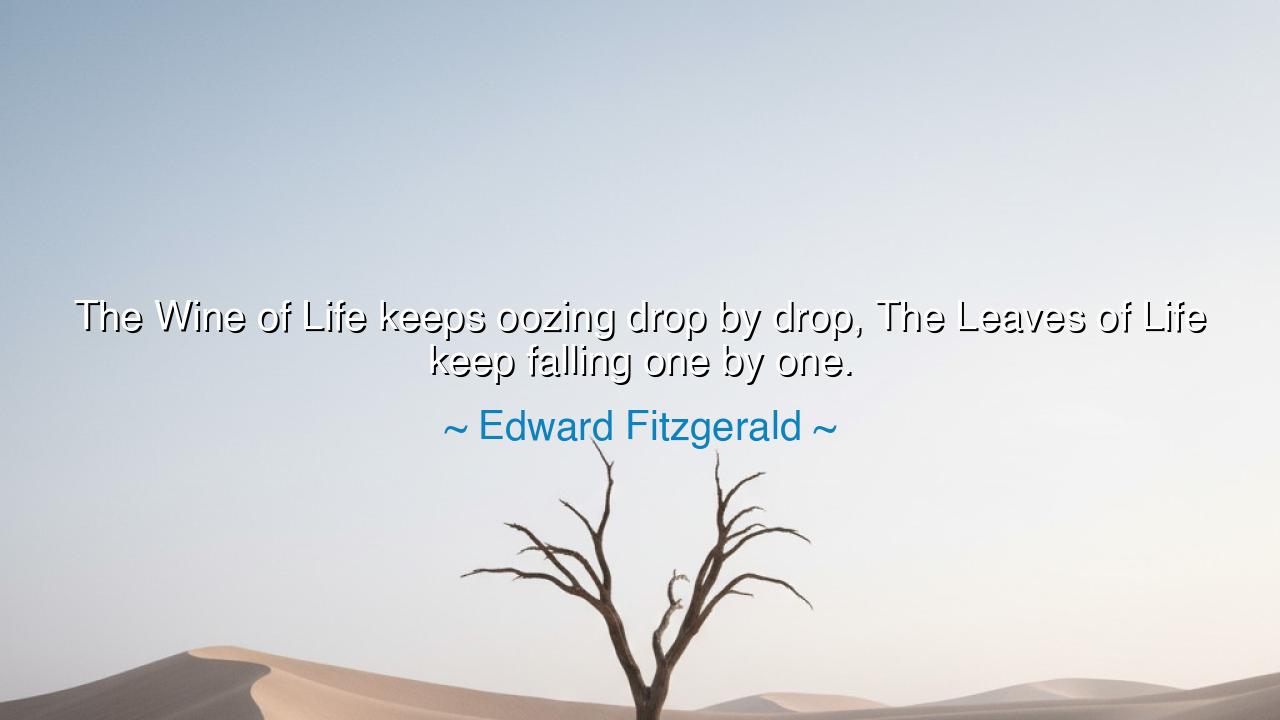
The Wine of Life keeps oozing drop by drop, The Leaves of Life
The Wine of Life keeps oozing drop by drop, The Leaves of Life keep falling one by one.






“The Wine of Life keeps oozing drop by drop, The Leaves of Life keep falling one by one.” Thus wrote Edward Fitzgerald, in his celebrated translation of The Rubáiyát of Omar Khayyám, that timeless meditation on mortality, joy, and the fleeting passage of time. In these haunting lines, Fitzgerald gives voice to the same truth that has echoed through the hearts of philosophers and poets since the dawn of thought—that life flows away as gently and inexorably as wine from a broken cup, that our days fall silently, like autumn leaves, until at last the vessel is empty and the tree stands bare. It is a vision both melancholy and profound, for within its sadness lies a call to awaken—to live while the wine still flows, to cherish each leaf before it falls.
The origin of these lines reaches deep into the wisdom of the East, for they are born from the verses of Omar Khayyám, the Persian poet, astronomer, and philosopher of the eleventh century. Khayyám gazed at the heavens and saw both the beauty and the futility of human existence—the glittering stars that endure for ages while men vanish like dew. Fitzgerald, centuries later, poured that ancient spirit into English verse, turning Khayyám’s meditations into a mirror for the soul of the modern world. The “Wine of Life” becomes, in his hands, the very essence of time—sweet and intoxicating, yet always slipping away; while the “Leaves of Life” remind us that each moment we lose is a fragment of our being, falling quietly into the past.
In these lines, the Wine is the measure of our vitality, our experiences, our joys and sorrows blended into one bittersweet elixir. Each drop that “oozes” away marks the passage of time—slow but unstoppable. The verb “oozing” itself is deliberate: it suggests not the violence of loss, but the slow, relentless surrender of life to time. And the Leaves, those fragile emblems of life’s cycles, fall one by one—not in torrents, but with grace, with inevitability. Thus, Fitzgerald and Khayyám together capture the rhythm of existence—not a storm, but a sigh; not a blaze, but a gradual dimming. They teach us that mortality is not to be feared but to be understood, for it gives meaning to the wine we drink and the days we live.
Think, for a moment, of the life of Marcus Aurelius, the Roman emperor and Stoic philosopher. Surrounded by war, duty, and loss, he too wrote of time as a river—ever flowing, carrying away all that we love and all that we are. “All that is from the past is as a tale told,” he said. Yet, instead of despairing, he found peace in acceptance. Like Fitzgerald’s wine and Khayyám’s leaves, Marcus saw that the beauty of life lies not in its permanence but in its passing. The awareness that each day slips away “drop by drop” teaches us not to cling to what we cannot keep, but to live fully within the moment given.
There is also an echo here of the changing seasons, that eternal symbol of renewal and decay. The leaves must fall for the tree to rest, and from the fallen leaves, new life will one day arise. So too with man: our moments fall away, but the spirit, the memory, the love we leave behind—these nourish the soil of the generations to come. The Wine of Life is not wasted if it has been shared; the Leaves of Life are not lost if they have given shade while they lasted. The lesson of Fitzgerald’s line, as of Khayyám’s philosophy, is not despair at mortality, but reverence for its beauty. For what would joy mean, if not for its brevity? What would love be, if not a fragile bloom upon the branch of time?
And yet, beneath the poetry lies a warning. Too many live as though their wine were endless, as though their leaves would never fall. They squander days in distraction, in greed, in forgetfulness, waiting for some grand moment that never comes. Fitzgerald’s image invites us to awaken—to taste the wine while it still flows, to feel the breeze while the leaves still cling. It is a call to gratitude, to presence, to the art of living consciously. To lament the oozing away of life is natural—but to waste it while lamenting is the greater tragedy.
So, my child of the fleeting world, take this wisdom into your heart: do not fear the slow dripping of the wine, nor the falling of the leaves. Rather, savor the taste of each drop, and find beauty in each leaf before it falls. Live not as a miser of moments, hoarding your days in fear of their loss, but as a generous soul who spends them with joy. Share your wine with others, for that is how it multiplies; lift your eyes to the falling leaves, for they remind you to love while there is time.
For in the end, Fitzgerald’s words—like Khayyám’s before him—speak not of death, but of awakening. The wine will cease, the leaves will fall, but if you have lived well, if you have loved, created, and given light, then you will not mourn the passing of the season. You will have fulfilled your part in the great rhythm of life. And when the cup runs dry and the branches stand bare, the soul will whisper with calm and knowing: I have tasted the wine, and it was sweet. I have seen the leaves fall, and it was beautiful.






AAdministratorAdministrator
Welcome, honored guests. Please leave a comment, we will respond soon